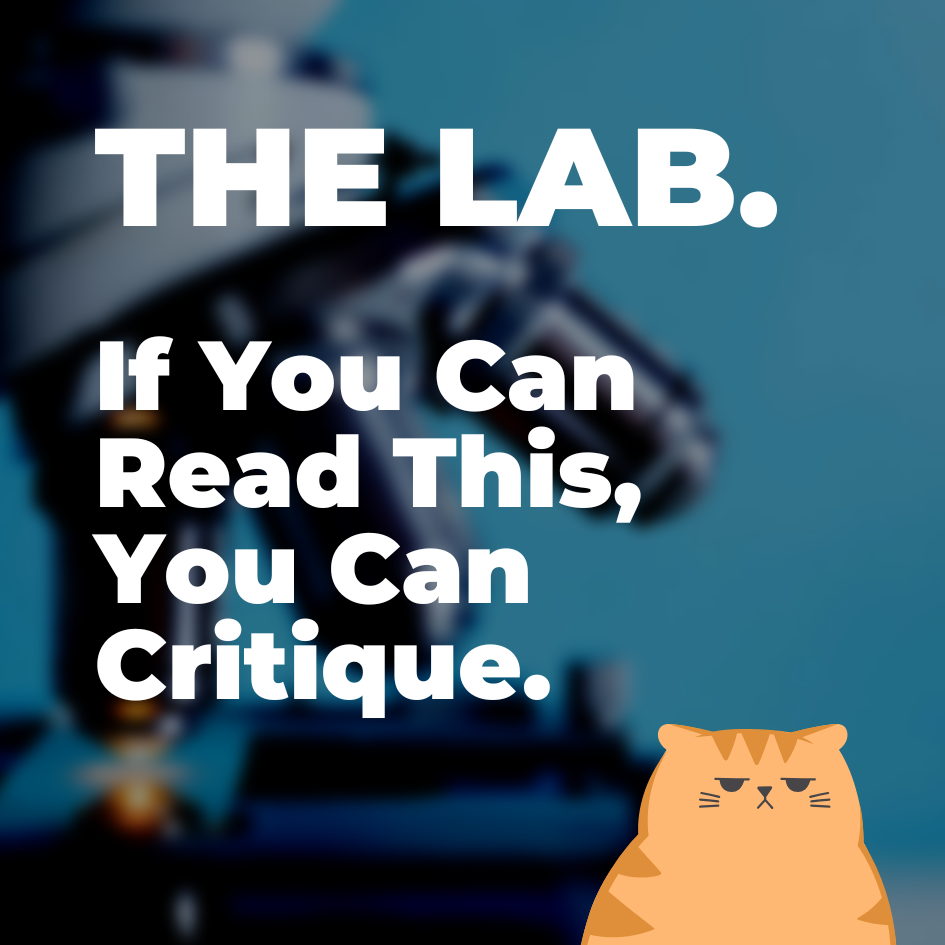- Feb 3, 2024
- LitBits
- 0
New blog post by Jake E – discussions in this thread, please
---
I recently had a great movie night with my daughter. We made a fort (three kitchen chairs with a blanket thrown over the top and far too many stuffed toys to get comfortable), we made popcorn and a bowl of Skittles, and settled down in the living room to watch a movie with all the lights off and the curtains drawn.
It was a lovely evening, despite the inevitable back pain I suffered from being hunched over on the floor, and the movie we chose was a large part of that.
My daughter, being seven, hasn’t seen many great movies yet, and I feel it is my solemn duty as her father to make sure she gets to (Last time, it was the Lord of the Rings trilogy. Yes, I made her watch all three. No, not all at the same time.)
This time, we chose Shrek. I had fond memories of watching it when I was younger and thought she’d enjoy it too, but I had forgotten how good it was.
I was not prepared.
You see, in my humble opinion, Shrek is a perfect story.
It has everything. Humour, stakes, romance, character arcs you could build a cathedral on…and John Lithgow being phenomenal as Lord Farquad (seriously, his delivery of the lines should be studied. They’re fantastic.)
Perfect. So, obviously, I had to unpick it and find out why.
Humour, and voice acting greatness aside, I think Shrek’s brilliance resides with its main character’s journey. It is a character arc so relatable it drills deep into the heart and wrenches it right out of your chest.
A loner misanthrope, he’s an ogre who hates everyone and wants to be left alone. He gives hints that this is not who he truly is (An ogre is like an onion will forever be the greatest simile) but it is said so nonchalantly you almost handwave it away. He delights in his rubbish jokes that no one seems to understand, and it shows that he’s a nice guy despite his hostile outward appearance.
He accepts Donkey with an almost faux reticence, that, again, hints at his internal loneliness. Once he saves the princess and is lauded as a hero, he begins to soften and as the two of them grow closer, his walls come down and he admits to Donkey that he keeps people at arm’s length because he can’t believe that anyone would ever want to be friends with an ogre like him. It is a defence mechanism that allows him to remain unhurt.
So far, so standard. So what, I hear you ask, makes Shrek so special.
Well… nothing. There are so many perfect movies and novels out there that Shrek doesn’t stand out all that much, but it’s the things these stories have in common that makes them noteworthy.
Shrek is a perfect story, not because of its humour or voice acting, but because it follows the rules. It knows what it’s doing and does it well.
You get invested with Shrek. You can relate to him, which is why the next part of the story hits like a freight train.
He lowers his guard, believing that maybe this princess could look past his outer layers and see the onion underneath. He resolves to ask her and builds up the courage to do so. He even picks her a flower and just as he’s about to knock at her door, he overhears her saying that he is a monster and that no one could ever love someone like him.
Crushed, he leaves and brings Lord Farquad to the princess, takes his reward and goes back to his swamp. His walls are back up and reinforced. He even tries to get Donkey to leave.
The Dark Night of the Soul is the name often given to this part of a hero’s journey. After learning to let his guard down he retreats to his old, safe ways. Shutting himself away in his swamp and pushing the only friend he’s ever had out of his life. He wallows in self-pity which manifests as anger and aggression.
His friend reveals that what he heard was a misunderstanding and that the princess really does like him. Initially, Shrek does not believe it, but his journey has changed him, and he gives Donkey the benefit of the doubt and rushes to stop the wedding. He does, they kiss, and it turns out the princess is an ogre too and has been all along.
Happy ending.
Karaoke dance party.
My daughter laughed and clapped. She said, “Daddy, that was a great film. Can we watch the second one?”
I had to take a minute. Several times throughout the film, I felt my eyes prickle with the threat of tears, and I thought of the last time a film had done that to me. (It was IF, if you’re wondering. Also, a great film.)
It’s rare that a story can hit you like that. Especially, after the ridiculous dancing – and for some reason, French – Robin Hood, slapstick comedy, and fart jokes. I don’t think Shrek gets enough credit for its superb writing. Shrek should be on every creative writing course as a case study on how to write a phenomenal character arc. You can learn so much from simply paying attention.
And I think from now on, whenever someone asks me for advice on writing, I’m going to simply say:
“Go and watch Shrek.”
J
---
By @Jake E
Get the discussion going – post your thoughts & comments in the thread below…
---
I recently had a great movie night with my daughter. We made a fort (three kitchen chairs with a blanket thrown over the top and far too many stuffed toys to get comfortable), we made popcorn and a bowl of Skittles, and settled down in the living room to watch a movie with all the lights off and the curtains drawn.
It was a lovely evening, despite the inevitable back pain I suffered from being hunched over on the floor, and the movie we chose was a large part of that.
My daughter, being seven, hasn’t seen many great movies yet, and I feel it is my solemn duty as her father to make sure she gets to (Last time, it was the Lord of the Rings trilogy. Yes, I made her watch all three. No, not all at the same time.)
This time, we chose Shrek. I had fond memories of watching it when I was younger and thought she’d enjoy it too, but I had forgotten how good it was.
I was not prepared.
You see, in my humble opinion, Shrek is a perfect story.
It has everything. Humour, stakes, romance, character arcs you could build a cathedral on…and John Lithgow being phenomenal as Lord Farquad (seriously, his delivery of the lines should be studied. They’re fantastic.)
Perfect. So, obviously, I had to unpick it and find out why.
Humour, and voice acting greatness aside, I think Shrek’s brilliance resides with its main character’s journey. It is a character arc so relatable it drills deep into the heart and wrenches it right out of your chest.
A loner misanthrope, he’s an ogre who hates everyone and wants to be left alone. He gives hints that this is not who he truly is (An ogre is like an onion will forever be the greatest simile) but it is said so nonchalantly you almost handwave it away. He delights in his rubbish jokes that no one seems to understand, and it shows that he’s a nice guy despite his hostile outward appearance.
He accepts Donkey with an almost faux reticence, that, again, hints at his internal loneliness. Once he saves the princess and is lauded as a hero, he begins to soften and as the two of them grow closer, his walls come down and he admits to Donkey that he keeps people at arm’s length because he can’t believe that anyone would ever want to be friends with an ogre like him. It is a defence mechanism that allows him to remain unhurt.
So far, so standard. So what, I hear you ask, makes Shrek so special.
Well… nothing. There are so many perfect movies and novels out there that Shrek doesn’t stand out all that much, but it’s the things these stories have in common that makes them noteworthy.
Shrek is a perfect story, not because of its humour or voice acting, but because it follows the rules. It knows what it’s doing and does it well.
You get invested with Shrek. You can relate to him, which is why the next part of the story hits like a freight train.
He lowers his guard, believing that maybe this princess could look past his outer layers and see the onion underneath. He resolves to ask her and builds up the courage to do so. He even picks her a flower and just as he’s about to knock at her door, he overhears her saying that he is a monster and that no one could ever love someone like him.
Crushed, he leaves and brings Lord Farquad to the princess, takes his reward and goes back to his swamp. His walls are back up and reinforced. He even tries to get Donkey to leave.
The Dark Night of the Soul is the name often given to this part of a hero’s journey. After learning to let his guard down he retreats to his old, safe ways. Shutting himself away in his swamp and pushing the only friend he’s ever had out of his life. He wallows in self-pity which manifests as anger and aggression.
His friend reveals that what he heard was a misunderstanding and that the princess really does like him. Initially, Shrek does not believe it, but his journey has changed him, and he gives Donkey the benefit of the doubt and rushes to stop the wedding. He does, they kiss, and it turns out the princess is an ogre too and has been all along.
Happy ending.
Karaoke dance party.
My daughter laughed and clapped. She said, “Daddy, that was a great film. Can we watch the second one?”
I had to take a minute. Several times throughout the film, I felt my eyes prickle with the threat of tears, and I thought of the last time a film had done that to me. (It was IF, if you’re wondering. Also, a great film.)
It’s rare that a story can hit you like that. Especially, after the ridiculous dancing – and for some reason, French – Robin Hood, slapstick comedy, and fart jokes. I don’t think Shrek gets enough credit for its superb writing. Shrek should be on every creative writing course as a case study on how to write a phenomenal character arc. You can learn so much from simply paying attention.
And I think from now on, whenever someone asks me for advice on writing, I’m going to simply say:
“Go and watch Shrek.”
J
---
By @Jake E
Get the discussion going – post your thoughts & comments in the thread below…




